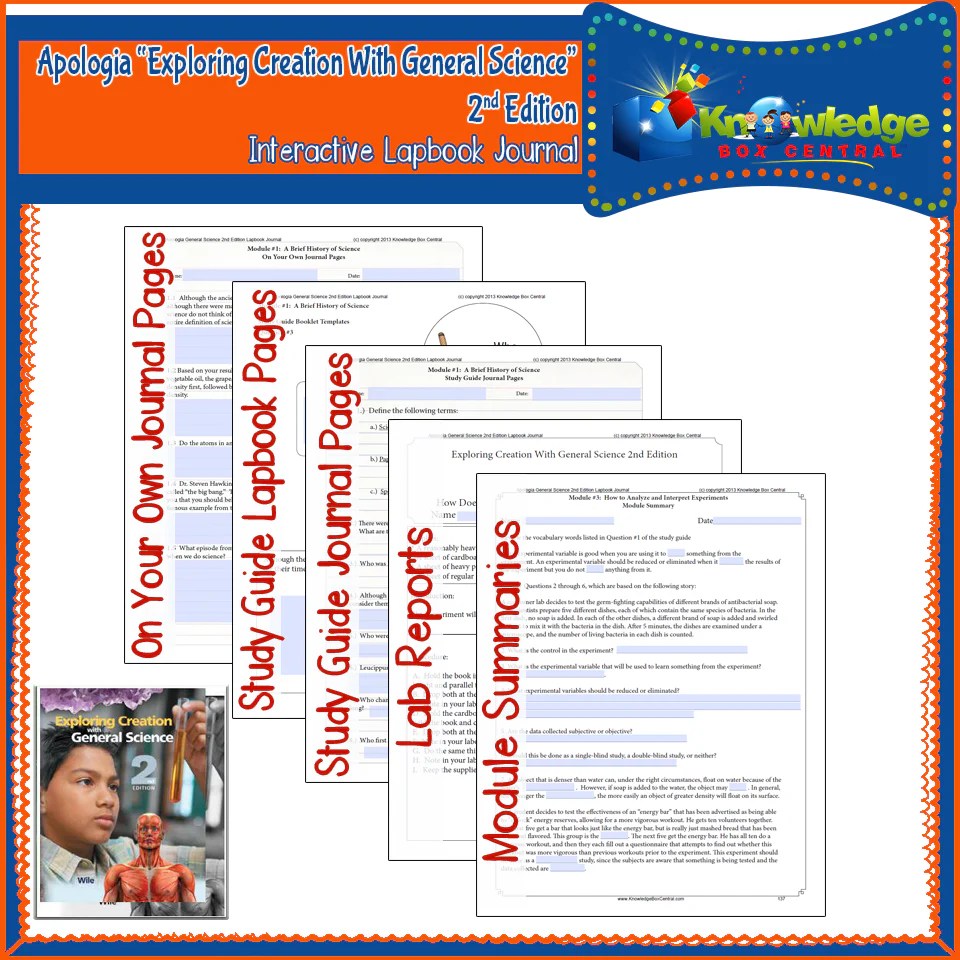Apologia General Science 2nd Edition embarks on a journey to equip students with a comprehensive understanding of scientific concepts and theories. Designed for high school students, this text aims to foster scientific literacy and cultivate a passion for exploring the natural world.
Within its pages, Apologia General Science 2nd Edition meticulously covers a wide range of scientific disciplines, including biology, chemistry, physics, astronomy, and earth science. Its systematic organization and engaging pedagogical approach make it an invaluable resource for educators seeking to nurture scientific curiosity in their students.
Introduction

Apologia General Science 2nd Edition is a comprehensive science textbook designed for high school students. It provides a rigorous and engaging exploration of the fundamental concepts in physical science, earth science, and life science.
The book is written in a clear and accessible style, making it suitable for students with a wide range of abilities. It is also extensively illustrated with diagrams, charts, and photographs, which help to clarify the concepts being discussed.
Intended Audience
Apologia General Science 2nd Edition is intended for high school students who are interested in learning about the fundamental concepts of science. It is also suitable for homeschooling families who want to provide their children with a strong foundation in science.
Purpose
The purpose of Apologia General Science 2nd Edition is to provide students with a comprehensive understanding of the fundamental concepts of science. The book is designed to help students develop critical thinking skills, problem-solving skills, and an appreciation for the natural world.
Content Analysis
Apologia General Science, 2nd Edition, covers a wide range of scientific topics, providing a comprehensive overview of the natural world. The book is organized into six units:
- The Nature of Science
- Chemistry
- Biology
- Earth Science
- Physics
- Astronomy
Each unit is further divided into chapters that explore specific topics within the broader subject area. For example, the Chemistry unit includes chapters on the periodic table, chemical reactions, and acids and bases.
Pedagogical Approach
Apologia General Science uses a variety of pedagogical approaches to engage students and promote learning. These include:
- Inquiry-based learning:Students are encouraged to ask questions, make observations, and conduct experiments to discover scientific concepts.
- Hands-on activities:The book includes numerous hands-on activities that allow students to apply their knowledge and develop practical skills.
- Real-world examples:The book provides real-world examples to help students connect scientific concepts to their everyday lives.
- Critical thinking exercises:Students are asked to analyze data, draw conclusions, and solve problems to develop their critical thinking skills.
The pedagogical approach in Apologia General Science is designed to make science accessible and engaging for students, while also fostering their critical thinking and problem-solving skills.
Key Concepts and Theories
Apologia General Science 2nd Edition introduces students to a wide range of scientific concepts and theories, providing a solid foundation in the principles that govern the natural world. These concepts are presented in a logical and engaging manner, allowing students to gradually build their understanding and develop a comprehensive scientific worldview.
The book’s approach to presenting concepts and theories is highly interactive and experiential. It incorporates hands-on activities, experiments, and real-world examples to help students connect abstract scientific principles to their everyday experiences. This approach fosters a deeper understanding of the concepts and encourages students to apply their knowledge to new situations.
Scientific Method
The scientific method is a fundamental concept that is emphasized throughout the book. Students learn about the steps involved in the scientific process, including observation, hypothesis formation, experimentation, data analysis, and conclusion drawing. They also learn about the importance of controls, variables, and scientific communication.
Biology, Apologia general science 2nd edition
The book covers a broad range of biological topics, including cell structure and function, genetics, evolution, and ecology. Students learn about the basic principles of life, including the structure and function of cells, the mechanisms of heredity, and the processes of natural selection and adaptation.
They also explore the interactions between organisms and their environment, and the importance of biodiversity.
Chemistry
The chemistry section introduces students to the fundamental principles of matter and its properties. They learn about the structure of atoms and molecules, chemical bonding, and chemical reactions. The book also covers topics such as the periodic table, states of matter, and solutions.
Physics
The physics section explores the fundamental laws of motion, energy, and matter. Students learn about concepts such as force, velocity, acceleration, and momentum. They also investigate the principles of energy conservation, heat transfer, and electricity and magnetism.
Earth Science
The Earth science section provides an overview of the Earth’s systems and processes. Students learn about the structure of the Earth, the processes that shape its surface, and the interactions between the Earth’s atmosphere, hydrosphere, and biosphere. They also explore topics such as plate tectonics, weather, and climate change.
Experiments and Activities
Apologia General Science 2nd Edition includes a variety of experiments and activities designed to help students learn scientific concepts. These experiments and activities are hands-on and engaging, and they provide students with opportunities to apply their knowledge in a practical setting.
The experiments and activities in Apologia General Science 2nd Edition are aligned with the National Science Education Standards (NSES). They are also designed to be age-appropriate and developmentally appropriate for students in grades 6-8.
Types of Experiments and Activities
The experiments and activities in Apologia General Science 2nd Edition fall into three main categories:
- Demonstrations:Demonstrations are teacher-led activities that illustrate scientific concepts. They are typically used to introduce a new concept or to reinforce a concept that has already been taught.
- Laboratory experiments:Laboratory experiments are student-led activities that allow students to test hypotheses and collect data. They are typically used to help students develop their understanding of a scientific concept.
- Projects:Projects are long-term activities that allow students to apply their knowledge of science to a real-world problem. They are typically used to help students develop their problem-solving skills and their ability to communicate scientific information.
How Experiments and Activities Help Students Learn
Experiments and activities help students learn scientific concepts by providing them with opportunities to:
- Observe scientific phenomena firsthand:Experiments and activities allow students to see scientific concepts in action. This helps them to develop a deeper understanding of how the world works.
- Test hypotheses:Experiments and activities allow students to test their own ideas about how the world works. This helps them to develop their critical thinking skills and their ability to solve problems.
- Collect and analyze data:Experiments and activities allow students to collect and analyze data. This helps them to develop their data analysis skills and their ability to draw conclusions from data.
- Communicate scientific information:Experiments and activities allow students to communicate scientific information to others. This helps them to develop their communication skills and their ability to share their knowledge with others.
Examples of Experiments and Activities
Here are a few examples of the experiments and activities that are included in Apologia General Science 2nd Edition:
- Demonstration:The teacher demonstrates how to make a simple circuit using a battery, a light bulb, and some wire.
- Laboratory experiment:Students design and conduct an experiment to test the effects of different fertilizers on plant growth.
- Project:Students design and build a model of a solar system.
Assessment and Evaluation
The Apologia General Science 2nd Edition provides a range of assessment tools to evaluate student learning and progress. These tools include:
- Chapter Quizzes:Short quizzes at the end of each chapter that test students’ understanding of the key concepts and theories covered in the chapter.
- Unit Tests:More comprehensive tests that assess students’ knowledge and understanding of the material covered in each unit.
- Lab Reports:Written reports that document students’ observations, data, and conclusions from the experiments and activities they conduct.
- Projects:Larger-scale assignments that allow students to apply their knowledge and skills to real-world problems or projects.
- Portfolios:Collections of student work that demonstrate their progress and achievement over time.
These assessment tools can be used to evaluate student learning in a variety of ways. For example, chapter quizzes can be used to assess students’ understanding of the key concepts and theories covered in each chapter, while unit tests can be used to assess students’ overall knowledge and understanding of the material covered in each unit.
Lab reports can be used to assess students’ ability to conduct experiments, collect data, and draw conclusions, while projects can be used to assess students’ ability to apply their knowledge and skills to real-world problems or projects. Portfolios can be used to assess students’ progress and achievement over time.By
using a variety of assessment tools, teachers can gain a more comprehensive understanding of students’ strengths and weaknesses, and can tailor their instruction to meet the needs of individual students.
Strengths and Weaknesses: Apologia General Science 2nd Edition
Apologia General Science 2nd Edition offers various strengths and weaknesses that influence its classroom usage.
Strengths:
- Comprehensive Coverage:The book thoroughly covers a wide range of science topics, ensuring students receive a broad understanding of the subject.
- Biblical Integration:The text integrates scientific concepts with biblical principles, fostering a connection between faith and science for students.
- Engaging Activities:The book includes numerous hands-on activities and experiments that make learning interactive and enjoyable.
- Supplemental Resources:Apologia provides online resources, including videos, quizzes, and lesson plans, which enhance student learning.
Weaknesses:
- Inconsistent Difficulty:The text’s difficulty level varies throughout the chapters, which can be challenging for some students.
- Limited Depth:Due to its comprehensive coverage, the book may not provide sufficient depth in certain topics.
- Outdated Information:Some scientific information in the book may be outdated, requiring supplementation with current resources.
- Teacher Dependence:The book requires a knowledgeable teacher to guide students through complex concepts and facilitate discussions.
Recommendations for Improvement:
- Adjust Difficulty:Revise the text to ensure a more consistent difficulty level throughout.
- Expand Depth:Provide more in-depth coverage of key topics while maintaining the comprehensive scope.
- Update Information:Regularly review and update scientific information to ensure accuracy.
- Enhance Teacher Support:Develop additional teacher resources, such as lesson plans and professional development materials, to support educators.
Frequently Asked Questions
What is the target audience for Apologia General Science 2nd Edition?
Apologia General Science 2nd Edition is primarily designed for high school students seeking a comprehensive introduction to the field of science.
How does Apologia General Science 2nd Edition approach scientific concepts?
Apologia General Science 2nd Edition presents scientific concepts in a clear and engaging manner, utilizing a variety of pedagogical techniques such as real-world examples, hands-on activities, and thought-provoking questions.
What are the strengths of Apologia General Science 2nd Edition?
Apologia General Science 2nd Edition excels in its comprehensive coverage of scientific disciplines, its rigorous approach to learning, and its commitment to fostering a deep understanding of scientific principles.
Are there any weaknesses associated with Apologia General Science 2nd Edition?
While Apologia General Science 2nd Edition provides a solid foundation in science, some critics argue that its focus on Christian perspectives may limit its appeal to students from diverse backgrounds.
